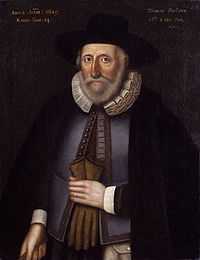Thomas Hobson

Thomas Hobson (1544–1 January 1631[1]), sometimes called "The Cambridge Carrier", is best known as the name behind the expression Hobson's choice.
A mail carrier from Cambridge, England, Hobson delivered mail between London and Cambridge, operating a livery stable outside the gates of St Catharine's College. When they were not needed to deliver mail, Hobson's horses were rented to students and academic staff of the university.
Hobson soon discovered that his best (and fastest) horses were the most popular, and overworked. To prevent further exhaustion of his best horses, Hobson devised a strict rotation system, only allowing customers to rent the next horse in line. His policy, "this one or none", has come to be known as "Hobson's choice", when an apparent choice is in fact no choice at all. The term originated in the mid-seventeenth century.[2]
The poet John Milton popularised both Hobson and the phrase, twice commemorating him in epitaphs, and in issue 509 of Addison and Richard Steele The Spectator from 1712.
In addition to his contribution to English vernacular, Hobson is also remembered for his involvement in the construction of Hobson's Conduit, a man-made watercourse built in 1614 to provide clean drinking water to the city of Cambridge. Hobson was one of the primary benefactors of the new stream.[3] Hobson's Conduit is alternatively known as Hobson's Brook. Hobson bought Anglesey Priory in 1625 and converted it into a country house, which, under the name Anglesey Abbey, now belongs to the National Trust. Subsequently, Hobson lived at Chesterton Hall in 1627, four years prior to his death in 1631.
The author Terry Pratchett has also used Hobson as model for a character in the novel Going Postal from 2004.
References
- ↑ Penguin Pocket On This Day. Penguin Reference Library. 2006. ISBN 0-14-102715-0.
- ↑ The Mavens' Word of the Day: Hobson's choice
- ↑ Hobson's Conduit at Follies, Folly Towers Obelisks and Monuments around the UK